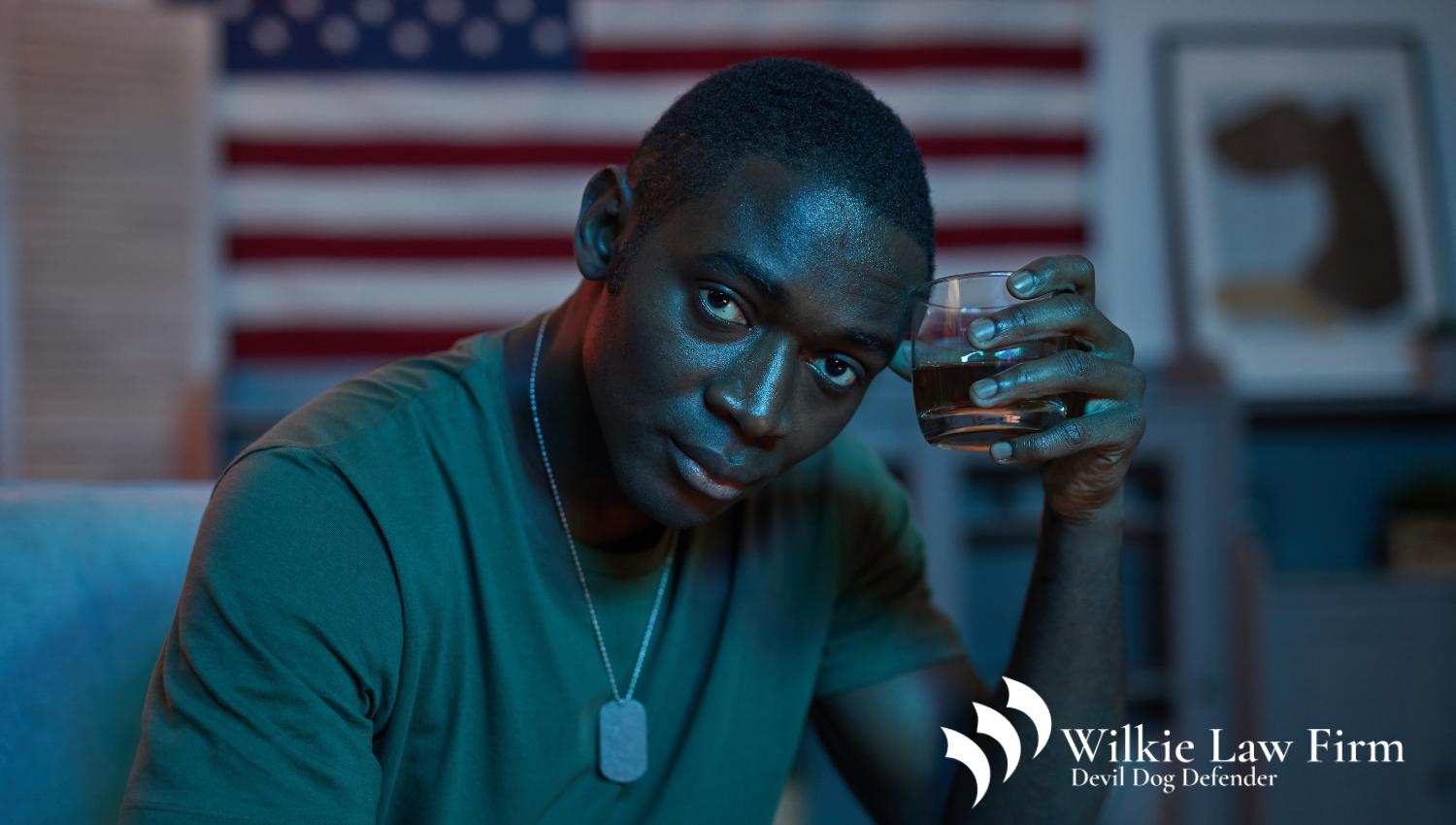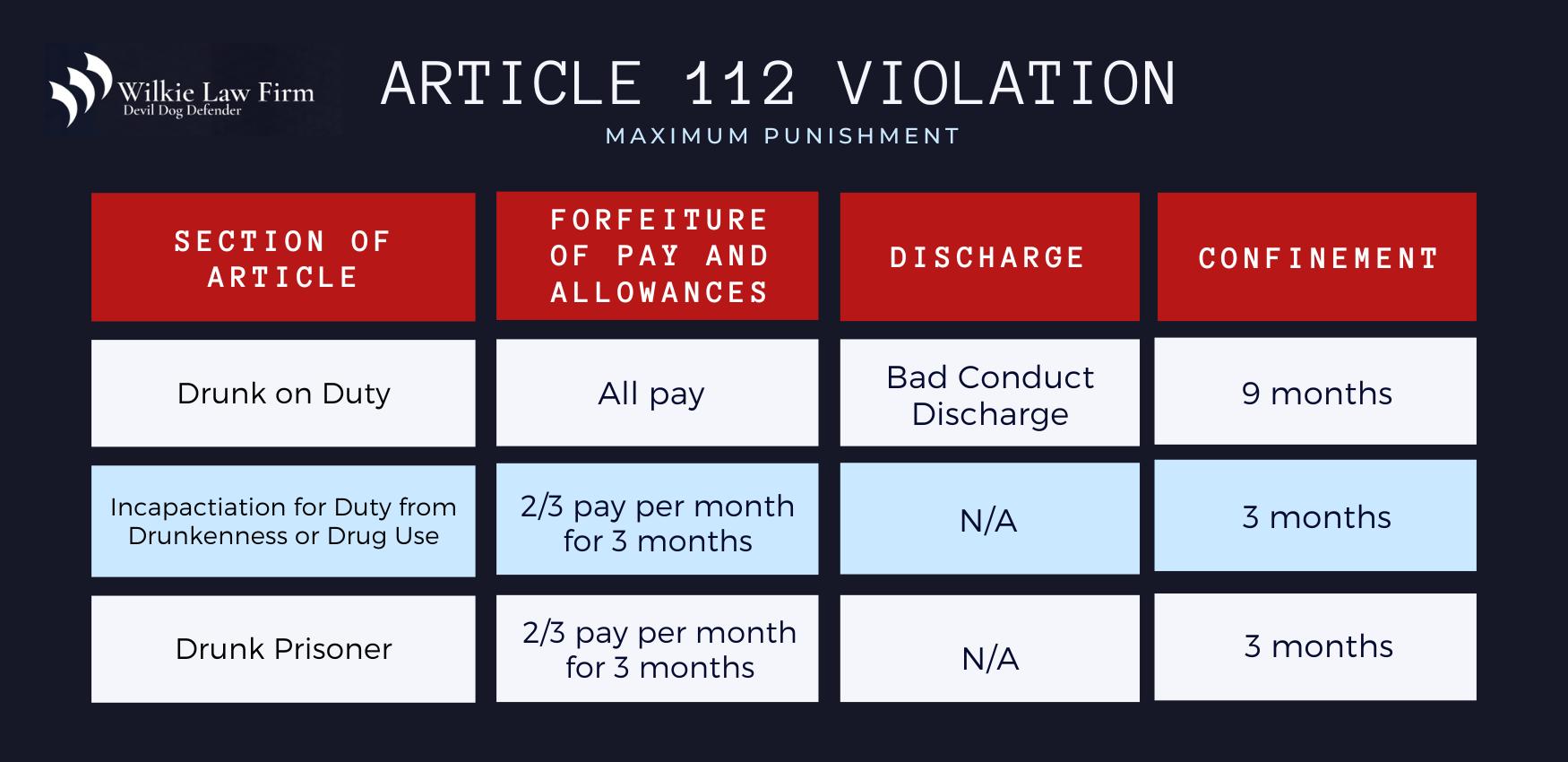UCMJ Article 112
Military Defense Attorney for Article 112 Violations
Home » UCMJ Articles » UCMJ Article 112
Military Counsel
UCMJ Articles
Article 112 of the UCMJ - Drunkenness and Other Incapacitation Offenses
Table of Contents
Service members of the U.S. armed forces are subject to a unique set of regulations as outlined in the Uniform Code of Military Justice (UCMJ). This Code contains various articles that address distinct rights as well as breaches of military law, similar to the role that the U.S. Constitution plays for civilians. However, the military regulations provided in the Articles of the UCMJ are often notably stricter than the principles laid out in the Constitution, as enlisted service members are expected to conform to the high moral and behavioral standards set by the military.
When a military member fails to uphold the standards that are expected of them, they may be accused and charged with a violation of the UCMJ. One of these violations in particular deals with the offense of being intoxicated while on duty. Below, seasoned North Carolina military defense attorney Aden Wilkie of the The Wilkie Law Group covers the specifics surrounding UCMJ Article 112, which pertains to drunkenness and other incapacitation offenses in the military.
Can Military Drink in Uniform?
Military members are not entirely prohibited from the consumption of alcohol while in uniform. In fact, drinking alcohol is typically very common within military culture. However, there is a time and place for everything, and the consumption of alcohol by a service member while in uniform is still subject to strict regulations and guidelines.
For instance, if a service member is intoxicated while on duty and/or incapacitated in any way for the performance of a specific duty, they may face serious repercussions, including being convicted under the UCMJ and facing disciplinary actions. As such, responsible alcohol consumption and adherence to the established rules are critical in maintaining the standards of conduct expected within the military community.

What is UCMJ Article 112?
UCMJ Article 112 (10 U.S.C. 912) covers Drunkenness and Other Incapacitation Offenses. More specifically, it covers the offense of being drunk on duty, incapacitation for duty from drunkenness or drug use, and being drunk as a prisoner. The exact text from the Manual for Courts-Martial is as follows:
1. Drunk on Duty —
Any person subject to this chapter who is drunk on duty shall be punished as a court-martial may direct.
2. Incapacitation for Duty From Drunkenness or Drug Use —
Any person subject to this chapter who, as a result of indulgence in any alcoholic beverage or any drug, is incapacitated for the proper performance of duty shall be punished as a court-martial may direct.
3. Drunk Prisoner —
Any person subject to this chapter who is a prisoner and, while in such status, is drunk shall be punished as a court-martial may direct.
Definitions
In the context of this Article, drunk refers to “the state of intoxication by alcohol that is sufficient to impair the rational and full exercise of mental or physical faculties” or “the state of meeting or exceeding a blood alcohol concentration in a person’s blood of 0.08 grams of alcohol per 100 milliliters of blood and with respect to alcohol concentration in a person’s breath of 0.08 grams of alcohol per 210 liters of breath, as shown by chemical analysis.”
Incapacitated, on the other hand, simply means the service member is “unable to properly perform duties as a result of previous alcohol consumption or drug use.” For example, if a service member is hungover from drinking too much the night before and cannot perform their duties to the extent that is expected of them, they would be considered incapacitated.
Elements of UCMJ Article 112
In a UCMJ Article 112 charge, simply stating that a service member committed an alcohol-related offense is not enough. The prosecution’s case hinges on proving that certain elements are present. The required elements are listed below:
For Drunk on Duty Charge
- That the accused was on a certain duty; and
- That the accused was drunk while on this duty.
For Incapacitation for Duty From Drunkenness or Drug Use Charge
- That the accused had certain duties to perform;
- That the accused was incapacitated for the proper performance of such duties; and
- That such incapacitation was the result of previous indulgence in intoxicating liquor or any drug.
For Drunk Prisoner Charge
- That the accused was a prisoner; and
- That while in such status the accused was drunk.
What is the Punishment for a UCMJ Article 112 Violation?
Depending on the conduct in question, a service member charged with violating UCMJ Article 112 can face serious consequences if convicted, including the loss of military benefits, demotion, time spent in military prison, and even discharge from the military. Below, we’ll provide the maximum punishment for each offense listed under Article 112.
For those found Drunk on Duty, service members may face:
- Forfeiture of all pay and allowances;
- Confinement for up to 9 months;
- A bad-conduct discharge.
For those found guilty of Incapacitation for Duty from Drunkenness or Drug Use, maximum penalties include:
- Forfeiture of ⅔ pay each month for 3 months;
- Confinement for up to 3 months.
And finally, a Drunk Prisoner conviction may warrant a punishment of:
- Forfeiture of ⅔ pay each month for 3 months;
- Confinement for up to 3 months.

Top Military Defense Attorney for Article 112 Violations
If you are facing the serious consequences of a UCMJ Article 112 violation or any other alcohol-related offenses, trust us when we say you don’t want to navigate the complexities of the military justice system alone. The prosecution will work hard to prove your guilt and secure the maximum punishment available, which is why you need the help of a skilled military lawyer like Aden Wilkie to fight for your rights, freedom, and military career.
At The Wilkie Law Group, our dedicated team of criminal defense lawyers is here to provide the experienced legal representation you need. We understand the gravity of these charges and will carefully review all evidence to build a strong defense strategy and obtain the most favorable outcome possible, whatever that may be for your unique situation.
Contact an Article 112 Defense Attorney
You’ve served your country, now allow us to serve you by working to protect your future and guiding you through this challenging time. Contact our law firm today for a confidential consultation – you can reach us by calling 910-333-9626 or completing our online intake form.





